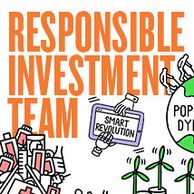We assess the role that carbon offsetting can play within the transition to a lower-carbon world.
*Better strategic alignment and incentives may be required from governments to aid the low-carbon transition.
*Achieving collective climate goals will require a reappraisal of taxes, regulation and carbon pricing.
*Despite not tackling the root problem of present emissions, carbon offsetting can be a viable option for investors focused on tangible carbon-reduction actions.
The debate over the virtues of investor divestment versus engagement with the oil industry continues to be a hot topic. In our view, divestment has gained a recent relative advantage, owing to the continuing underwhelming performance of energy shares, which has been exacerbated by the recent demand-led collapse in the oil price.
For large asset owners, however, engagement remains an important policy tool. We view it as a direct way of influencing better environmental outcomes by using our presence on the shareholder register of heavy carbon-emitters to influence future corporate strategy, alongside advocating for policy change at a government level.
Commitments to decarbonize a company or an economy by 2050 are only meaningful if they are accompanied by a concrete plan of action to which management and politicians can be held accountable by stakeholders.
Behavioral Shift
In addition, achieving stated climate goals will require the correct incentives in the system (taxes, regulation, carbon pricing, etc.) in order to drive a shift in behavior across all economic actors and encourage capital to flow more rapidly to low-carbon solutions. At present, long-term climate aspirations often run counter to tax or growth policies, so better strategic alignment and incentives are needed if climate-change policies are to become more than mere good intentions.
Difficult as this might be to accept, it is likely that the major fossil-fuel companies will have to be incentivized to become part of the solution to the climate-change challenge, through a balanced mix of incentives and regulation to shift the allocation of capital from fossil fuels to renewables, hydrogen and carbon capture. While demand for fossil fuels continues to grow, society needs to be given a firmer and more sustained nudge to move to low-carbon forms of energy, as well as lowering the use of oil and gas in the production of materials such as steel, cement and plastic.
With major energy companies planning to make up for lost growth from the continuing decarbonization of electricity by, for example, building enormous petrochemical plants to meet rising demand for plastic from the developing world, we are not going to see the eradication of demand for oil and gas – even if we all switch to driving electric vehicles.
Beyond the divestment and engagement options, and in the absence of sufficient numbers of politicians getting to grips with the range of incentives in the system, investors and companies are increasingly turning to carbon offsetting as an alternative way to contribute to the reduction of carbon in the atmosphere. One well-known airline, for example, recently launched an offset scheme with an impact investment firm that allows customers to select from a variety of climate-impact projects in the developing world, with clear and measurable carbon-reduction objectives. Others have introduced zero-carbon strategies where efficiency gains are used alongside offsets to meet their goals.
Issues with Offsets?
Carbon offsets are not always popular, as they are seen as not tackling the root cause of emissions – and may even lead to higher overall emissions if people are given comfort that an offset gives them license to emit more carbon by, say, flying more. There is also the challenge that emissions being made today are only being offset at some distant point in time when, for example, trees come to maturity and become carbon sinks. Another challenge is that, rather than direct action at the source of emissions, outsourcing the reduction of carbon places a dependency on the actions of others being maintained.
On the positive side, offset projects can also work with lower-income communities to help reduce poverty and improve standards of living. In addition, they continue to raise broad awareness of the issue of climate change.
Despite these valid concerns, we believe offsetting has a role to play, and that it can be an attractive option in the investment industry, where clients are increasingly focused on tangible carbon-reduction actions. The demand for active engagement by charity boards, pension trustees and private wealth firms is steadily increasing, often because the younger generation is demanding more accountability on the investment decisions taken on its behalf, and is asking for its voice to be heard.
Here to Stay…For Now
Carbon-offset projects – whether via direct investments, carbon hedging within portfolios, or through ‘intentional impact’ share classes that direct fees to carbon-reduction projects – are under active consideration across the industry.
In our view, what they do is begin to offer clients new ways to match their values with the actions undertaken on their behalf by the investment managers to whom they entrust their money. At a time when energy firms are facing major near-term pressure on their balance sheets from pandemic-induced global shutdowns, we believe carbon offsets can be thought of as a bridge, or intermediate step, as industry tries to retool itself for a lower-carbon future.
Newton manages a variety of investment strategies. Whether and how ESG considerations are assessed or integrated into Newton’s strategies depends on the asset classes and/or the particular strategy involved, as well as the research and investment approach of each Newton firm. ESG may not be considered for each individual investment and, where ESG is considered, other attributes of an investment may outweigh ESG considerations when making investment decisions.
Any reference to a specific security, country or sector should not be construed as a recommendation to buy or sell this security, country or sector. Please note that strategy holdings and positioning are subject to change without notice.
Important information
This is a financial promotion. Issued by Newton Investment Management Limited, The Bank of New York Mellon Centre, 160 Queen Victoria Street, London, EC4V 4LA. Newton Investment Management Limited is authorized and regulated by the Financial Conduct Authority, 12 Endeavour Square, London, E20 1JN and is a subsidiary of The Bank of New York Mellon Corporation. 'Newton' and/or 'Newton Investment Management' brand refers to Newton Investment Management Limited. Newton is registered in England No. 01371973. VAT registration number GB: 577 7181 95. Newton is registered with the SEC as an investment adviser under the Investment Advisers Act of 1940. Newton's investment business is described in Form ADV, Part 1 and 2, which can be obtained from the SEC.gov website or obtained upon request. Material in this publication is for general information only. The opinions expressed in this document are those of Newton and should not be construed as investment advice or recommendations for any purchase or sale of any specific security or commodity. Certain information contained herein is based on outside sources believed to be reliable, but its accuracy is not guaranteed. You should consult your advisor to determine whether any particular investment strategy is appropriate. This material is for institutional investors only.
Personnel of certain of our BNY Mellon affiliates may act as: (i) registered representatives of BNY Mellon Securities Corporation (in its capacity as a registered broker-dealer) to offer securities, (ii) officers of the Bank of New York Mellon (a New York chartered bank) to offer bank-maintained collective investment funds, and (iii) Associated Persons of BNY Mellon Securities Corporation (in its capacity as a registered investment adviser) to offer separately managed accounts managed by BNY Mellon Investment Management firms, including Newton and (iv) representatives of Newton Americas, a Division of BNY Mellon Securities Corporation, U.S. Distributor of Newton Investment Management Limited.
Unless you are notified to the contrary, the products and services mentioned are not insured by the FDIC (or by any governmental entity) and are not guaranteed by or obligations of The Bank of New York or any of its affiliates. The Bank of New York assumes no responsibility for the accuracy or completeness of the above data and disclaims all expressed or implied warranties in connection therewith. © 2020 The Bank of New York Company, Inc. All rights reserved.






Comments